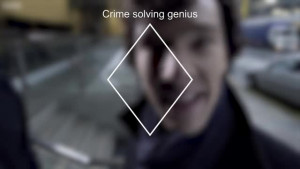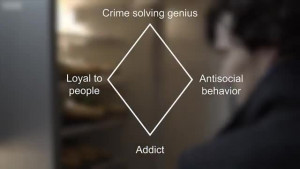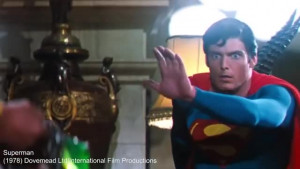Johnny Molson: Welcome to the Wizard’s Roundtable. Today, we talk to Peter Nevland about one of the key aspects in creating a bond between your business and your customer.
Peter Nevland: You’ve made them someone that people identify with and root for. And when they identify with them and root for them, well guess what the next step is? “I’m happy to give you my money.”
Johnny Molson: Think for a second about some of the great characters in literature or film or TV. From Scarlet O’Hara to Homer Simpson. From Walter White to Princess Leia, Sherlock Holmes, or Katniss Everdeen. Now, what is it you think that makes those characters so memorable? The secret is something that was taught at Wizard Academy called character diamonds. And it’s this idea of taking multi-facets — these contradictory polar opposites that make a character very, very interesting. And you could actually apply this not only to your business, but to you as an owner and how you communicate with your customers.
We pick it up with Peter Nevland talking about David Freeman and what he taught at the Academy on character diamonds.
Peter Nevland: And so David Freeman I guess discovered at Wizard Academy that Roy is teaching third gravitational bodies. And he’s like, “Oh, hey, you know what? I basically teach this stuff to filmmakers.” And David Freeman got to be so well known for this, that the gaming industry came and said, “Well, we can pay you a lot more money than Hollywood because we have more money than Hollywood.” And he goes, “Sure, I’ll take more money.” So now he’s basically advising all the gaming industry. And now you see a lot more in depth creation of characters for video games than there was at the time when, you know, they’re just making Super Mario Brothers eight bit. You know, jump over the turtles with the pointy stuff (laughter).
Johnny Molson: So to connect the dots, third gravitating bodies is the idea that when there’s just two things, it has predictable results. But when you add a third body in there, it sort of sets things a little bit off kilter and makes it more interesting. And that’s kind of where it connects with the concept of character diamonds is this idea of finding something that is opposite, but it also needs to be there to make a full person.
Peter Nevland: I think you can make it real simple. You can go and talk about, you know, NASA and rotational mathematics. You know, the mathematics rotating bodies, and that can get complicated. But I think you can make it real simple and say, your brain can only hold two things at the same time. When you add in a third, your brain has to either switch back and forth between, these two and these two or these two. And so it can never resolve them. Or your brain tries to say, well, these things are similar enough, I’m going to treat them as one. And so that’s why you have to, you know, we’re talking about character diamonds — you have to have three or maybe four things that are core to the character that will always cause them to respond a bit unpredictably.
 Tevye is a good example because, you know, is he going to be traditional and say “No. Tradition. We must do things the way that we’ve always done them.” Or is he going to embrace new technology like he does? Or, you know, he gets to the end of the movie and he says, “This I can not do. I can not go this far.” And you go, okay, it’s finally got an end. But then on the other side, he’s bombastic and angry and he’s sweet and sensitive.
Tevye is a good example because, you know, is he going to be traditional and say “No. Tradition. We must do things the way that we’ve always done them.” Or is he going to embrace new technology like he does? Or, you know, he gets to the end of the movie and he says, “This I can not do. I can not go this far.” And you go, okay, it’s finally got an end. But then on the other side, he’s bombastic and angry and he’s sweet and sensitive.
Teyve: “He’s an honest hard worker. But on the other hand… Tradition!”
Peter Nevland: And so you’re always looking at this guy: I don’t know what the heck he’s going to do next? You know, very interesting, right? He wins me over because I can identify with someone who is not perfect. I think that’s the thing that the character diamonds help us do. They help us create characters that are real. They feel authentic, they feel flawed. And yet they’re compelling, right? As long as you have enough and the good qualities outweigh the bad ones then you start to root for someone. I think part of what we’re rooting for in character diamonds is we’re rooting for people to overcome their issues because we see them. And so if you cover them up, they don’t have flaws. But if they have flaws and yet they still have these noble intentions and then they overcome them most of the time, well now that becomes a person that you one: identify with. And two: really help win, because when they win, you win.
Johnny Molson: So why employ a character diamond in an ad campaign?
Peter Nevland: We’re in the business of making a business something that people think first about, like, and hopefully trust enough to do business with them. And if you find a business that is willing to show some of its flaws, but also to show its noble intentions and how it overcomes those flaws. Now suddenly you’ve made the business and the owner of the business and the people who work for that business, you’ve made them, someone that people identify with and root for. And when they identify with them and root for them, well guess what the next step is? “I’m happy to give you my money.”
And if you provide the service that I expected to get, when you told me about them. And introduced me to this fascinating character, well, now I’m happy to tell other people, “Hey, these are the people you ought to go to because that was great.” Now of course it can backfire because if you don’t deliver on your promise, well then that’s only going to cement in their minds that “Well these people are not the noble purveyors of wonderful confectionery that they proclaimed to be. They’re actually scoundrels and swindlers and con artists and don’t ever trust them.” Right? So, I mean, character diamonds are powerful, but only as powerful as your ability to execute and deliver on what you promised.
Johnny Molson: So the business itself is a character, but also the business owner could be a character or a little bit of both?
Peter Nevland: That’s a really good point. Both. Yeah. So usually the business tends to reflect the values of the owner. Most of the time I’ve found when I set up character diamonds, the business usually looks very much like the owner. Or if you have a kind of like a tandem of two owners, then those usually it’s the combination of them that makes the business. And the owners will be a little bit different. And so what you end up having is the relationship between the two characters that you’re using in the campaign. There’s usually, you know, each one of them may have two or three of those characteristics that the business has. But then they also have another one that’s added in.
And I can give you an example, my client in Myrtle Beach. The whole business is they’ve got this whole timeliness, kind of excellence thing. It’s a heating and air conditioning company. And then another part of them is that they’ve got this fun aspect that goes along with them, right. So you’ve got the timeliness and you’ve got the fun, that’s how people relate to them. And the fun is the surprise. And then he’s got this intense loyalty to the past, but then he’s also like constantly looking for new things. He’s always coming up with new stuff, crazy out of the box types of thinking, right? But it turns out that the two characters are like Teyvi in the sense of of traditional versus embracing new technology and stuff.
So with the characters, it’s a little too boring for a character to embrace that. So they end up being like the odd couple. And so the fun part is in their interactions with each other, whereas one guy is definitely more anal and is scared of new things. But the owner himself embraces trying to shoot people out of cannons and stuff like that. Whereas the first shows his loyalty to his parents and stuff, but then the other guy shows his loyalty to the excellence commitment. So he brings in the excellence part. You know, the other guy brings in the heart and you can see how one them is the commitment to getting things done and doing them the right way all the time. And the other guy is like, “How can we do this different?”
And together that makes up the whole of the company. And so as long as whoever comes to the door, exemplifies the character traits that both these guys represent, then people are going to go, “Hey, you know, Marty and Richie, the main characters, they just showed up at my door. And they feel like they’re connecting with the guys.
Johnny Molson: And why this is important is because typically what happens in advertising is that we try to put up our best face. “Here’s the company, we’re nice and clean or button-ed down. We’ll always do the job for you. We’re smart. We know what’s going on.” And that’s missing some humanity. So what are you looking for when you’re building a character diamond? In other words, talk a little bit about these polar opposites that exist.
 Peter Nevland: So a character diamond, as it suggests, it’s got four corners, right? Think of it more like a baseball diamond than the diamond on your ring. You start off at the top. And the top and the bottom are gonna be kind of these outward facing characteristics that everybody sees all the time. So at the top you have the thing that everybody knows them for. Let’s take Sherlock Holmes because he’s super easy and we talk about him all the time. The thing that you know first about Sherlock Holmes at the top that’s outward facing is that he is a crime solving genius. Well, the thing that’s other thing that’s very obvious that’s outward facing is that he is an addict. In the new Sherlock Holmes, he was addicted to the patch and the old one, it was, you know, cocaine or various versions, whether it was heroin or opium or cocaine or whatever. He fails when he’s not addicted to something. I think when they made that show Elementary and he was a clean cut guy and he was just smart and good (chuckling ruefully).
Peter Nevland: So a character diamond, as it suggests, it’s got four corners, right? Think of it more like a baseball diamond than the diamond on your ring. You start off at the top. And the top and the bottom are gonna be kind of these outward facing characteristics that everybody sees all the time. So at the top you have the thing that everybody knows them for. Let’s take Sherlock Holmes because he’s super easy and we talk about him all the time. The thing that you know first about Sherlock Holmes at the top that’s outward facing is that he is a crime solving genius. Well, the thing that’s other thing that’s very obvious that’s outward facing is that he is an addict. In the new Sherlock Holmes, he was addicted to the patch and the old one, it was, you know, cocaine or various versions, whether it was heroin or opium or cocaine or whatever. He fails when he’s not addicted to something. I think when they made that show Elementary and he was a clean cut guy and he was just smart and good (chuckling ruefully).
You’ve got to have a guy who solves crimes and also is kind of engaged in some illicit activity. And the other part of him being addicted is he’s not afraid to go be engaged in illicit activity. His reason for solving the crime is not because he’s altruistic. His reason is because, you know, he wants to challenge himself and it’s basically a selfish thing. And that leads you to then the inward facing things. On one pole of it is his vulnerability. And it’s interesting, you could reverse these. His vulnerability on one hand is his antisocial behavior. He doesn’t like people. People are a means to his ends. And then on the other hand, he’s incredibly loyal to the people around him. So there’s a contrast there. So which one’s the vulnerability, right?
 And so these kind of go back and forth. You’re rooting for Sherlock Holmes, you know. It’s okay that he’s an asshole sometimes. People are okay with that because they love that he’s doing the thing that he’s supposed to do. You know, we’ll, we’ll tolerate his abuse if he can just get the crime solved. And if he can also take us on a fun ride along the way.
And so these kind of go back and forth. You’re rooting for Sherlock Holmes, you know. It’s okay that he’s an asshole sometimes. People are okay with that because they love that he’s doing the thing that he’s supposed to do. You know, we’ll, we’ll tolerate his abuse if he can just get the crime solved. And if he can also take us on a fun ride along the way.
Johnny Molson: Right. And I think we tolerate it because we see in those flaws ourselves. You know, we don’t want to see somebody who is perfect and shiny and no breaks or cracks. Because we’re not perfect and shiny and without cracks. So when you can see somebody who embodies that idea that, “Yeah, I’m a little broken, but I’m still forging ahead through life.” It’s a lot easier to bond with that. And again, this is where the advertising comes back in is we’re trying to get customers to bond with these businesses. To consider them friends.
Peter Nevland: You hit it right there, trying to get customers to bond. If you’re trying to get a customer to bond with a business, with a business owner… If they’ve bonded with you, are they more likely to buy from you or the person they didn’t bond with, but that offers them a lower price? I mean, it’s that simple. I think we come back to it. Think about the way that we are as humans, even going back to say, let’s say the story of Jesus. You know, who loves to root for the perfect unaffected champion? Nobody does. And apparently God was trying to tell us, or Jesus, if you believe that Jesus is who he says he is — what Jesus is trying to tell us was God himself is vulnerable. And whenever I used to go and tour, I used to tell people, look, if you want to grab an audience’s attention, be confident. If you want to change their lives, mix with that confidence that vulnerability.
If you can open yourself up and make yourself a vulnerable target that people could easily shoot at, they suddenly stop wanting to shoot at you and they want to start covering for you and rooting for you to succeed. And the same thing with the business owners. If God himself doesn’t hide his vulnerabilities, for the love of your customers and the money in your bank account, stop hiding your vulnerabilities. I’m not saying go out and shout them to the hilltops and say, “Look, I want to show you, I’ve got a small penis.” (laughter) This is not what we’re talking about. Right? It’s not where we’re taking people,.
Johnny Molson: Don’t write that ad. That’s not appropriate. (laughter)
Peter Nevland: That’s not the ad. That doesn’t make someone trust you. Maybe it does at the poetry slam, you know, but they express that stuff like that. This is business. Okay. People are not expecting that. They’re wanting to know do you sometimes maybe get a little bit more angry than you should at injustice? I can identify with that. Do you maybe sometimes say things that you shouldn’t? You say things too bluntly and somebody has to rein you in. I can identify with that. Are you perhaps unwilling to be cheap and you’re a little bit expensive, right? But you get the best quality and it’s balanced out. I can understand that. Now we’re not covering up the downside. Is there a downside? There’s always a downside.
Johnny Molson: How does a business owner find those vulnerabilities? I mean, we’re getting pretty deep into the mind and the heart of a business and a business owner. Who tells them this is your vulnerability and please expose it.
Peter Nevland: Yeah. Well you gotta find somebody who’s on your side, number one, that you trust. I think the way that the vulnerability gets laid out there is important too. Like I said, you don’t necessarily lead with your vulnerability. You want to show these things rather than telling people. A lot of times whenever I talk to business owners about their character diamonds, you can see how any character diamond that’s going to be interesting always relates to one that’s been famous somewhere in the past. And so when you can show a business owner, “Hey, look. You see this character, let’s say Sherlock Holmes because we’ve already talked about it. You know, you’re kind of like like Sherlock Holmes.”
“You notice how you kind of don’t like people that are kinda dumb?”
“Well, yeah because they’re dumb who doesn’t like those kinds of people?”
“Most people tolerate it better than some others, you know? But you notice how popular Sherlock Holmes is?”
“Yeah he’s really popular.”
“Is he still an asshole?”
“Yeah he’s still an asshole.”
“So guess what? Your business doesn’t require you to not be an asshole all the time. And we can show that somehow you are and maybe you’ve got this person in your life that balances that out and brings you back to center. So that you’re not so much, you know. Holmes had that too. And let’s pair you with someone that’s like Watson, why don’t we use that?”
When customers start seeing that out in the open, they start seeing those stories come out. Suddenly they’re caught up in the story. They want to see what’s going to be the next episode of the adventure in the story. Not so much because of the plot, more because of the people I want to get to know these people. And it’s been proven that we use TV, we use radio personalities as our surrogate friends. So why not use your commercials as a surrogate adventure for people to go on and get to know somebody that they might really be happy doing business with?
 Johnny Molson: And I guess to bring it all full circle, don’t be afraid to show your flaws. You know, the crack in the Liberty Bell is what makes that story interesting. Were it not for the crack it’s just a bell. But there’s something else going on there. There’s a flaw that draws you to it. So there’s a power in a flaw. Superman is much more interesting with kryptonite.
Johnny Molson: And I guess to bring it all full circle, don’t be afraid to show your flaws. You know, the crack in the Liberty Bell is what makes that story interesting. Were it not for the crack it’s just a bell. But there’s something else going on there. There’s a flaw that draws you to it. So there’s a power in a flaw. Superman is much more interesting with kryptonite.
Peter Nevland: Superman would be nothing without kryptonite.
Johnny Molson: It would get boring real fast.
Peter Nevland: Yeah. Kryptonite. And he cares deeply about humans who he’s not related to. Those two things are the things that set him back. Make him very, very, very interesting.
Johnny Molson: And you can apply these techniques to your advertising and make your business more compelling and make your yourself more compelling to potential customers because you’re showing them who you really are.
Peter Nevland: Absolutely. Yeah, who are you really. And I think it’s hard for you to see that about yourself. Can you see all the things that make you interesting to other people? When you look at yourself it’s very difficult. It usually takes an outside person. So make sure that the outside person is someone that you trust and that you know cares about you and believes in you even more than you believe in yourself.
Johnny Molson: There’s something wrong with someone that doesn’t have a flaw. It’s just not right.
Peter Nevland: Yeah, there is. That’s right. They’re clearly covering something up. And that’s why, you know, the investigations begin. Let’s find it. You notice that whenever somebody just admits it up front it’s just disarming. There’s an amazing amount of protection that actually comes through being vulnerable. Isn’t that cool? I’ve always found it performing on stage. You do this, right? When you’re in a play, have you ever made a mistake? What happens when you make a mistake in a play Johnny?
Johnny Molson: I mean, if the audience smells it, then they have fun with you too provided you don’t have a panic attack and throw up.
Peter Nevland: That’s right.
Johnny Molson: Yeah. So sometimes you just have to wink at the audience and go, “Yeah, I goofed let’s move on.”
Peter Nevland: And if you have fun with it, then they end up being almost more on your side for the rest of the show.
Johnny Molson: Yeah, totally.
Peter Nevland: Same thing in business. Oh, you made a mistake? Don’t let it mess you up. Or you have a flaw. That’s okay. Admit it. And just have fun with it and let other people go, “Yeah. Yeah I’ve made those mistakes myself.”
Johnny Molson: It’s a fascinating topic and it really does make for impactful advertising. And we could talk about it probably for the next hour or so. If you have any questions, put them in the comments on YouTube, or you can send an email to Peter or me.
- Marketing Has a Physics Problem - December 3, 2025
- AI is OK - August 14, 2025
- Emotion in Advertising Equals Dollars in Business - December 3, 2024
- Are You A Wiener Dog? Last Chance to Commit - August 9, 2022
- Wiener Dogs Forever: The Power of Crowd Promotion - August 2, 2022
- The Heart of a Wiener Dog: Character Diamonds - July 26, 2022
